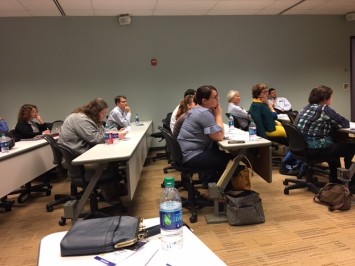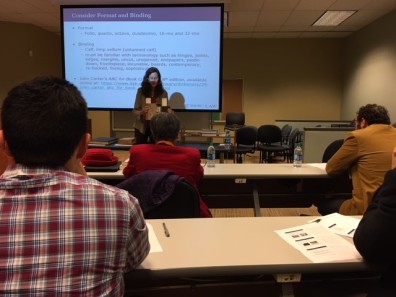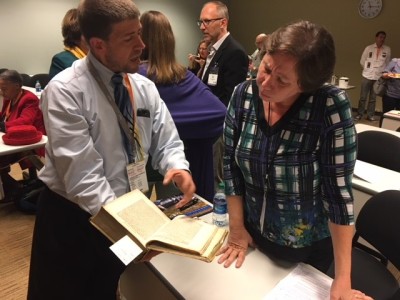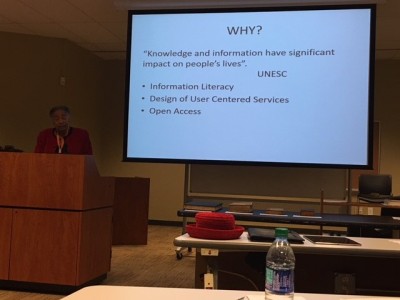By John Bamgbose

Workshop attendees pay rapt attention to the presentations.
The 36th annual course on International Law and Legal Information has come and gone. However, one of the things that will remain green in the hearts of the participants is the pre-conference workshop, which will remain in the annals of history of the association as the first of its kind in the 36 years of the workshop. On an unusually warm October afternoon, participants gathered from different parts of the world. The workshop provided the opportunity for some first timers to begin their familiarization and networking before the official opening ceremony which was to later take place in the evening. The pre-conference workshop’s theme was “Well, Isn’t That Special? A How-to Workshop on Creating and Using Archives and Special Collections in a Legal Research Context.”
Vanessa King, Assistant Law Librarian for Special Collections, and Jason LeMay, Assistant Law Librarian for Cataloging and Metadata, both of Emory University’s Hugh F. MacMillan Law Library, opened the floor by examining the topic entitled, “Special Collections: What Are They and How Do We Build Them?”

Vanessa King, Assistant Law Librarian for Special Collections at Emory University, presents at IALL 2017’s pre-conference workshop.

Jason LeMay, Assistant Law Librarian for Cataloging and Metadata, shows off some of Emory University’s rare collections.
The session provided a list of conservative and preservative measures that should be put in place to ensure that rare collections acquired in the law library are better preserved. Libraries must consider the temperature and humidity level of the storage area. Other germane issues include security concerns, the environmental condition, shelving, and storage demands. After the presentation, attendees were able to view some of the rare collections, under the guidance of Mr. LeMay. The resources ranged from paper-based collections of different sizes and ages. The session further enumerated factors that should be considered before starting up special collections.
The second session of the workshop, entitled “Making Special Collections Accessible to Users: Cataloging and Finding Aids,” took another interesting dimension by taking a cursory look at the technical activities that would guarantee proper arrangement of collections in a manner that library patrons could easily access the rare collections. The session was given by Clayton McGahee, Archives Manager at Emory University Libraries, and Marjorie Crawford, Head of Technical Services and Automated Services, Rutgers Law Library.

Marjorie Crawford, Head of Technical Services and Automated Services, Rutgers Law Library, speaks during her presentation on making special collections accessible to users.
Mr. McGahee’s presentation began with an overview of the finding aids available at Emory University. He noted that, while the transition to an electronic system is important in the knowledge economy, it is essential to set up standards. Ms. Crawford concluded the presentation with some nuggets to keep in mind when cataloging rare books and the available tools that can be leveraged when cataloging.
In the third session, “Using Archives and Special Collections in Your Classroom,” Professor Donna Troka, Associate Director of Teaching and Pedagogy at Emory’s Center for Faculty Development and Excellence, and Gabrielle Dudley, the Instruction Archivist and QEP Librarian at Emory’s Stuart A. Rose Manuscript, Archives, and Rare Book Library, chronicled their collaborative experience on a project called “Resisting Racism: From Civil Rights to #BlackLivesMatter.” Their presentation was a case study of best practice for collaborative engagement between the library and the faculty. Professor Troka describes how the collaboration came to be and then narrated the step-by-step process on how the project worked. Students structured their findings on how demographics, such as gender, sexuality, and race have functioned in anti-racist movements across history. The course gave rise to a physical exhibition in 2016 and a digital exhibit in fall 2016.

Professor Donna Troka, Associate Director of Teaching and Pedagogy, and Gabrielle Dudley, Instruction Archivist, Emory University, a moment before their presentation.
Acknowledgements: This recap was made possible due to the efforts of:
-
Cornell Law Library, which generously provided me with conference participation support as part of the Bitner Research Fellowship package;
-
Monica, whose camera was used to capture the pictures; and
-
An IALL board member who granted me her pre-conference slot, which enabled me to attend the workshop.